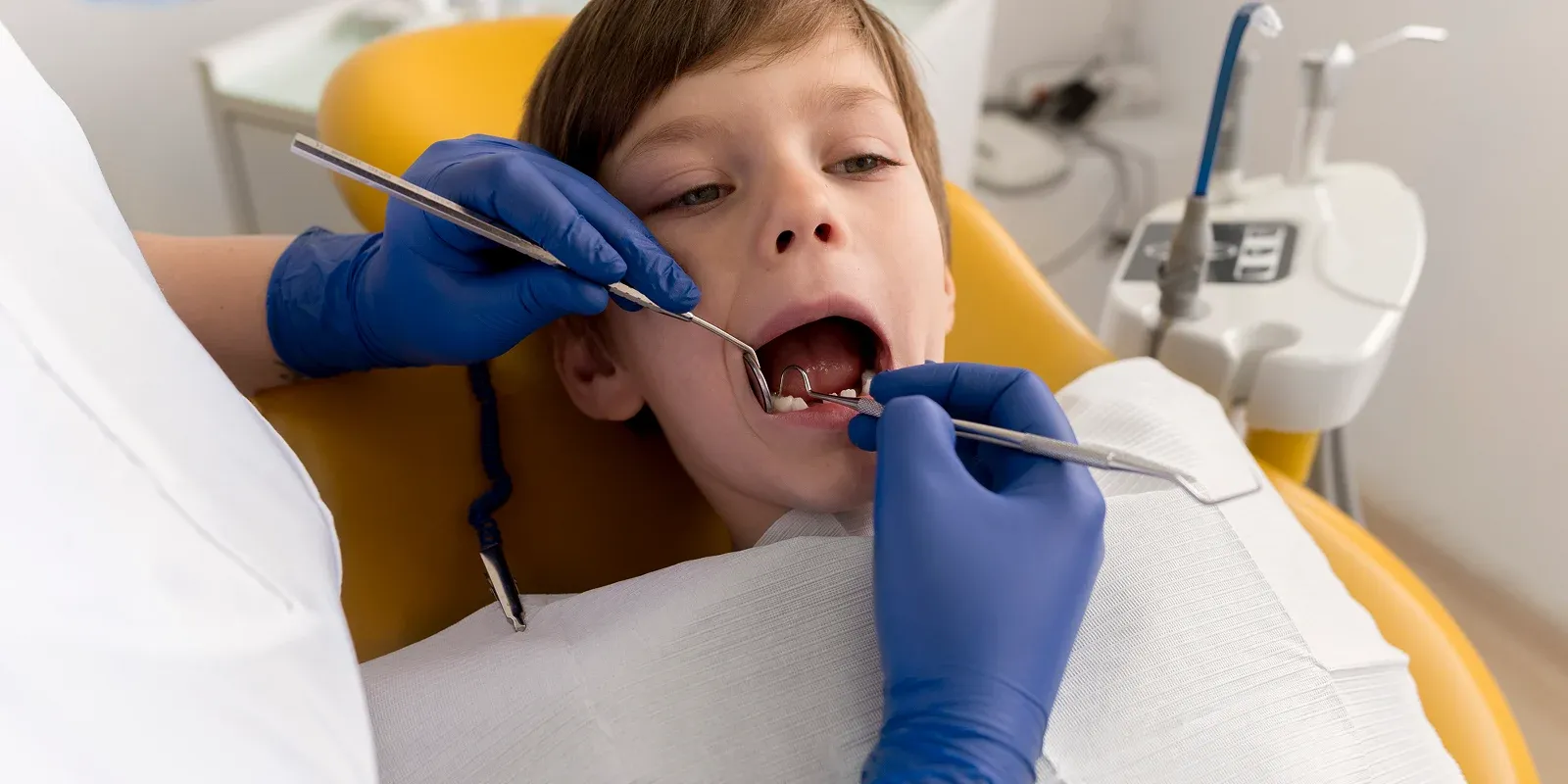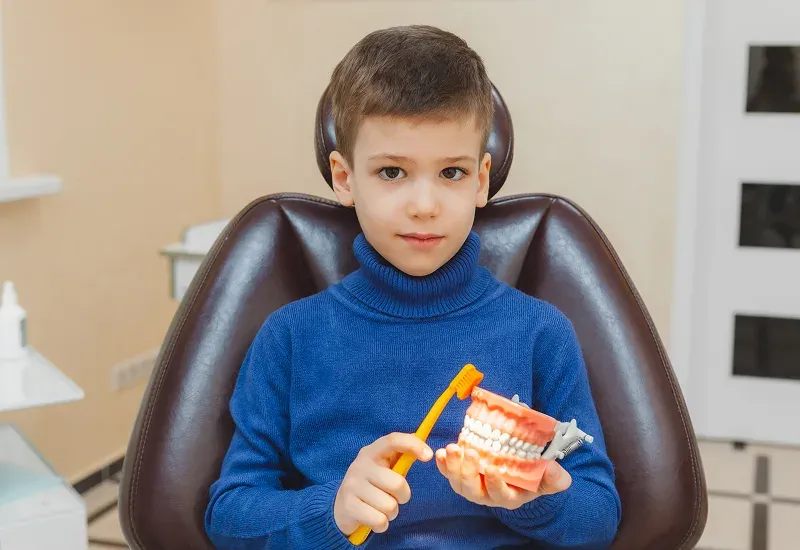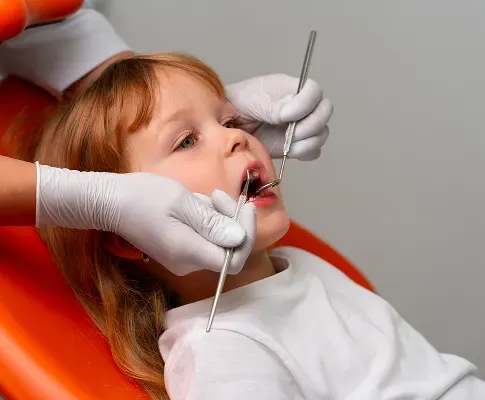
Common Pediatric Dental Problems and How to Prevent Them
Dr. Labeeb
23 June 2025
Dental problems in children do not only cause discomfort but can have effects on speech, nutrition, and overall development. Many parents face confusion when deciding how to protect their child’s oral health. This article will provide a detailed look at common pediatric dental problems and offer targeted prevention methods. It is crafted for parents who are ready to make informed choices and take decisive action.
Understanding Common Pediatric Dental Problems
Before prevention can be effective, parents need to understand the specific dental problems their children might face. Early childhood dental issues often differ from adult problems and require focused attention.

Early Childhood Caries (ECC)
Early childhood caries, or baby bottle tooth decay, is a rapid form of decay that affects infants and toddlers. It usually starts when teeth are exposed to sugary liquids for long periods, especially during naps or bedtime.
- ECC begins with enamel weakening caused by acids from bacteria feeding on sugars.
- The condition can quickly worsen, leading to cavities, pain, and infection.
- Signs include white spots or brown discoloration on teeth.
- Preventing ECC involves managing feeding habits and introducing oral hygiene early.
Malocclusion: Misaligned Teeth and Jaws
Malocclusion covers a range of issues involving the positioning of teeth or jaws. This problem can develop due to genetics or prolonged habits such as thumb sucking or pacifier use.
- Overbites, underbites, and crossbites affect chewing and speech.
- Early detection allows for interventions that can reduce future orthodontic needs.
- Persistent oral habits after age three increase the risk of malocclusion.
Dental Trauma in Children
Children are prone to accidents that may result in chipped or lost teeth. Quick response is crucial in these cases.
- Common causes include falls and sports injuries.
- Proper first aid can save a tooth that has been knocked out.
- Delayed treatment can cause infection or permanent damage.
Gum Issues: Gingivitis and Early Periodontal Disease
Although more common in adults, gum problems can begin in childhood. Inflammation from plaque buildup causes bleeding and redness in gums.
- Poor oral hygiene increases the risk of gum disease.
- Early treatment prevents progression to more severe conditions.
- Regular cleaning and flossing are key to maintaining gum health.
Prevention Strategies for Pediatric Dental Problems
Taking action to prevent dental problems early protects the foundation of a child’s oral health. Prevention is a combination of daily care, diet management, and professional guidance.
Preventing Early Childhood Caries
Early childhood caries can be prevented by changing feeding habits and establishing oral care routines.
- Avoid letting children sleep with bottles containing sugary liquids.
- Start brushing teeth with fluoride toothpaste as soon as the first tooth erupts.
- Limit sugary snacks and drinks outside meal times.
- Schedule the first dental visit by age one to assess risk.
Managing Habits That Cause Malocclusion
Certain behaviors affect jaw and teeth alignment. These habits require attention to prevent long-term issues.
- Discourage thumb sucking and pacifier use by age three.
- Encourage healthy swallowing and tongue positioning.
- Visit a pediatric dentist early for evaluation and possible interceptive treatment.
Reducing Risk of Dental Trauma
Accidents are sometimes unavoidable, but risks can be minimized.
- Use mouthguards during sports and active play.
- Childproof living spaces to reduce injury risks.
- Educate children on safe play and handling of objects.
- Know emergency steps for dental injuries, including tooth preservation.
Maintaining Healthy Gums
Gum health is a vital component of overall oral care. Parents should ensure children maintain consistent hygiene habits.
- Brush teeth twice daily with fluoride toothpaste.
- Begin flossing when teeth start to touch.
- Use dental visits for professional cleanings.
- Address signs of gum inflammation promptly.
The Role of Nutrition in Pediatric Dental Health
Nutrition directly impacts dental health in children. Parents often focus on sugar reduction but must consider the full spectrum of nutrients.
Essential Nutrients for Teeth and Jaw Development
- Calcium and vitamin D contribute to enamel strength and bone formation.
- Phosphorus works alongside calcium to maintain mineralization.
- Sources include dairy, leafy greens, and fortified products.
Managing Snacking and Beverages
- Limit sticky and sugary snacks that adhere to teeth.
- Encourage drinking water instead of sugary or acidic beverages.
- Maintain regular meal times to reduce frequent acid attacks.
Fluoride: A Key Component in Pediatric Dental Care
Fluoride’s role is critical but must be balanced carefully in children.
Appropriate Fluoride Use
- Use a smear of fluoride toothpaste for children under three.
- Increase to a pea-sized amount from ages three to six.
- Prevent swallowing toothpaste to avoid overexposure.
Professional Fluoride Treatments
- Dental offices provide fluoride varnish to strengthen enamel.
- Fluoride supplements may be advised in areas without fluoridated water.
- Regular dental visits allow monitoring of fluoride exposure.
Incorporating Modern Tools into Pediatric Oral Care
Advances in technology provide support for parents and children in maintaining dental health.
Electric Toothbrushes and Apps
- Electric toothbrushes improve brushing efficiency and engagement.
- Apps with timers and interactive features encourage routine.
Sealants and Minimally Invasive Treatments
- Sealants protect molars from decay in hard-to-clean areas.
- Laser dentistry offers less invasive treatment options.
- Tele-dentistry enables quick access to professional advice.
The Importance of Regular Dental Check-Ups and Professional Care
While daily home care is critical, regular dental visits are essential for maintaining pediatric oral health. These appointments provide a chance for early detection of problems that might not be visible or noticeable at home. A pediatric dentist can evaluate tooth development, check for early signs of decay, and monitor habits that affect jaw and teeth alignment.

Need Any Help?
Contact UsEarly Detection and Intervention
Routine exams enable dentists to identify dental caries in their earliest stages, before pain or visible cavities develop. Early intervention can prevent more extensive treatments such as fillings or extractions. For children with malocclusion or bite issues, timely referrals to orthodontists can reduce the need for complex procedures later in life.
Professional Cleanings to Remove Plaque and Tartar
Even the most diligent brushing and flossing may leave behind plaque and tartar in hard-to-reach areas. Professional cleanings remove this buildup, reducing the risk of gum inflammation and disease. Cleanings also help prevent bad breath and promote overall oral health.
Tailored Advice and Preventive Treatments
Dental professionals offer guidance tailored to the specific needs of each child. They can recommend fluoride treatments, apply sealants, and provide personalized oral hygiene instructions. This guidance helps parents reinforce effective habits at home and address any issues before they escalate.
Regular dental visits build a partnership between families and dental care providers, supporting proactive management of a child’s oral health. Scheduling visits every six months or as recommended ensures ongoing monitoring and preventive care.
Conclusion
Parents who are prepared to safeguard their child’s oral health should focus on prevention, early detection, and prompt treatment. It is essential to implement detailed oral care routines, manage nutrition thoughtfully, and seek professional care regularly. Understanding the specifics of pediatric dental problems and targeted prevention strategies provides a clear path to healthier teeth and gums for children.
Taking these steps now will reduce the need for complex dental procedures later and support the child’s overall health and well-being. Parents are encouraged to work closely with dental professionals to ensure the best care possible.
Contact your Dentist today at Studio city Dental, to learn more about Common Pediatric Dental Problems and How to Prevent Them.
Resource:
Wisdom Teeth Removal: Recovery Tips for a Smooth Healing Process
Share This:
Disclaimer
*This media/content or any other on this website does not prescribe, recommend, or prevent any treatment or procedure. Therefore, we highly recommend that you get the advice of a qualified dentist or other medical practitioners regarding your specific dental condition. *

